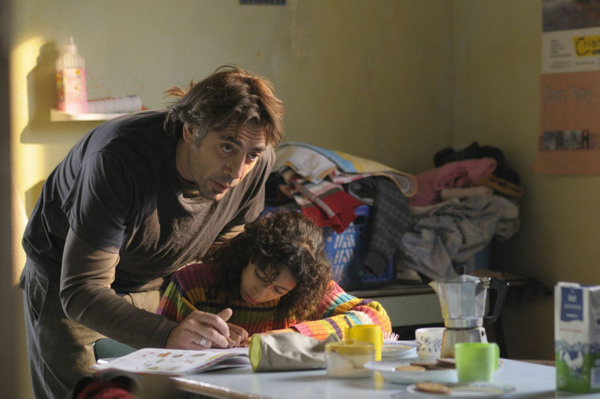Movie review by Greg Carlson
Alejandro Gonzalez Inarritu’s fourth feature “Biutiful” retains the director’s long-windedness while dispensing with the criss-crossing, interlocking approach to multiple plot threads that he employed in the loose trilogy of “Amores perros,” “21 Grams,” and “Babel.” Inarritu, whose preoccupation with death hovers over all of his features, inscribes “Biutiful” to his father, but despite the closeness shared between audience and principal character Uxbal (Javier Bardem), the movie struggles mightily to sustain its nearly two-and-a-half hour running time. Set in a gritty Barcelona a world away from the sun-dappled paradise inhabited by Bardem’s Juan Antonio in Woody Allen’s terrific “Vicky Cristina Barcelona,” “Biutiful” explores the end of a life not particularly well lived.
Bleak is assuredly the most commonly applied adjective in reviews of “Biutiful,” and Inarritu relentlessly constructs one nearly unbearable crucible after another. Close to the outset, we learn that black market fixer Uxbal has but a few months to live, as his prostate cancer spreads throughout his body. Unable to rely on his mentally unstable ex, whose parenting skills will give any mother or father the shudders, Uxbal turns to Liwei (Luo Jin) and Ige (Diaryatou Daff), undocumented aliens, to look after his two kids while he juggles daily conflicts arising from his shady business dealings.
Several detractors have pounced on Inarritu for what might be perceived as cultural opportunism, especially in the way the Chinese and Senegalese characters are engaged as exotic wallpaper in Uxbal’s colorfully wretched journey toward oblivion. While one subplot involving a secret relationship between two of Uxbal’s Chinese partners vexingly goes nowhere, Inarritu devotes enough time to Ige for her own plight to resonate with the viewer. Also in the director’s defense is the narrative’s unwavering dedication to Uxbal, whose shoulder and point of view are almost never abandoned.
As a guiding motif never more than a breath away, death announces itself in several manifestations throughout the movie. Uxbal makes additional cash as a clairvoyant who communicates with the departed, and while some skeptics cry foul, Inarritu wants the viewers to know he is a believer: frightening apparitions float near ceilings, and some of the ghosts communicate directly with Uxbal. In one sequence, Uxbal literally touches the face of the father he never met when an exhumation provides a surreal once-in-a-deathtime opportunity. In many ways, this memorable moment is the closest “Biutiful” comes to expressing Inarritu’s gift for synthesizing the grotesque and the transcendent, although regular collaborator Rodrigo Prieto’s photography frames cockroaches and asphyxiated sweatshop workers with a “fearful symmetry” that finds beauty in the unlikeliest of images.
In one unmistakably strange set-piece, Uxbal visits a club that might as well be called Purgatorio. Accompanied by the deafening thump of Underworld’s “Shudder/King of Snake,” Uxbal somnambulates through the crowd of sweaty revelers while gyrating dancers appear as sexual monstrosities, nipples sprouting from buttocks and giant breasts where heads should be. The entire outré enterprise carries Inarritu’s emotional manipulation past the point of bluntness, but then, whoever accused this filmmaker of subtlety? Fortunately, Bardem is a monumental screen presence, and his previous work, including “Before Night Falls,” “The Sea Inside,” and even “No Country for Old Men” indicates a pattern of suffering that reaches some kind of apex – or nadir – in “Biutiful.”
